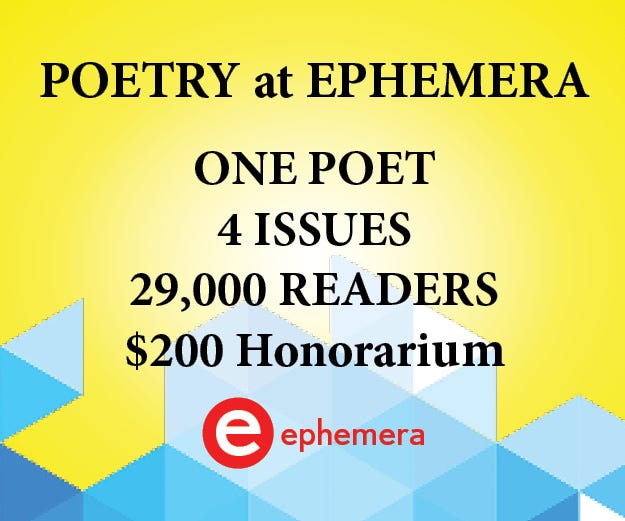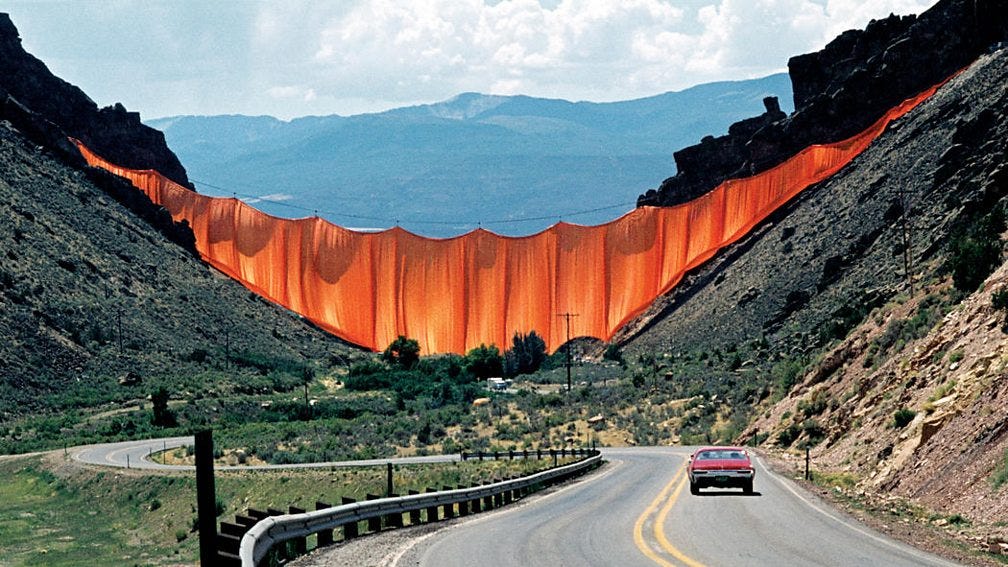Welcome to the Ephemera Newsletter free edition, Naizuud! (Mongolian for “friends”)
We’ve extended the deadline for the Good Contrivance Residency. Please gather your materials and submit by Oct 1. That will be the final deadline and we politely want to mention we can’t make any exceptions for folks who email after that date.
Please join us to support the letter so we can continue to bring weird tidbits, mini essays, artists and music from a writerly lens, opportunities and other literary and creative ephemera!
Poetry Sept is here with our finalist, Avren Keating who will be the poet for the month! You can review their poems altogether once they publish as well as an artist statement and bio on this dedicated post. We thank you for checking out Avren’s work.
On to our standard content matters: Won’t you please check out last week’s free issue if you missed it.
And here are some reminders:
Monthly Invite to Submit: We are open for November now. September 30 is the deadline. Paying the reading fee will grant you 1-month paid access to Ephemera’s full letter. Learn more or:
In Brief…this week’s features:
Thoughts on the artist duo Christo and Jeanne-Claude.
Listening to Albert Hammond Jr., of The Strokes and thinking about collaboration.
September’s poet, Avren Keating’s second of four poems, “A Skipping Stone.”
3 magazines with open calls
3 awards/prizes
3 recent job listings for editors and writers.
Interesante: In this issue, we look into how to brainstorm and colab with questions.
Book Recs, bonus content, and our mini-essays to start!
Recent Past:
Last Month’s Free Issue
Extended Deadline October 1
or
Merci. Danke. Kiitos. 고마워 Go-ma-wo. Cảm ơn. Xiè xiè.
Ephemera
Writing to you at the last minute on this equinoctial Sunday, equal day equal night—colloquially speaking—with an interest in balancing, collaboration. Thesis-antithesis-synthesis. Let’s focus on those interactions, with others or with self, which yield positive growth for our creative practice. Reach out to a great reader or volunteer yourself if you’re the reader (we need more of this). Maybe it’s time to consider working with a great editor again, or finding one if you’ve not ever. A great brain storm session—or question storm! (see this week’s Interesante below for negotiating cooperative thinking spaces)—with a friend or peer who likes to wade into the proverbial or even physical weeds (sometimes a shared activity is what gets the juices flowing). For us, it’s been a little bit of solo-communing mixed with volunteering our labor for friends’ projects mixed with some intense bouts of co-creating in the kitchen while listening to cutting edge science writing. Everyone has their processes and those change over time, sometimes over years, sometimes as quickly as week by week.
“(Albert Hammond Jr.) worked with Canadian singer-songwriter and poet Simon Wilcox … in order to find the words. … he sent Wilcox a folder of about 30 songs, fully fleshed out, except for the words. They didn’t meet in person, but spoke for long hours on the phone, about their lives, ‘the shadows and the shame.’ After each conversation, Wilcox would go away, write lyrics on her typewriter, put them in an envelope, drive over to where Hammond Jr was living and post them into his letterbox. Just one version, no copies. A precious thing.”
—Interview with Albert Hammond Jr in The Guardian
We’re marveling, this issue, over a pair of co-creative artists who while concepting together co-create with their subject by using its essence while simultaneously disrupting the form of the objects and geographies of their subjects. In a way, this describes cooperative bands such as The Strokes, who we alighted on last week. We’re thinking of the band process for Albert Hammond Jr., who took that co-creative and cooperative model solo only to find himself, per the pull quote above, artfully collaborating with a poet on lyrics for his new projects. What an interesting process. Which points to the obvious suggestion that we writers branch out to other artists and look to practice our words through and as influenced by disparate art media—ekphrastic! Our exclamation also speaks to one-sided collaborations with acts or art or passersby (people gazing) or nature, as they say… Watch and react and be yourself and un-you and un-un-you as need be, as you can be, as much you and the ‘un’ variety as collaboration and co-gravitation allows.
Talarkhal!
(Gratitude)
Poetry by Avren Keating
A Skipping Stone Big hand’s on 1:20, little hand’s on me and flings me outward, a skipping stone skimming across the cloud tops toward the faint blue glow still on the horizon. It looks like you did when you said you still loved me. Night trailing behind, holding onto my shoulders. I thought I could catch up to that west light and finally be rid of the dark. I won’t quite make it in time going in circles. I’ll always be a here, and you’ll always be a there: across the table across the country, across from my disbelief. Because who would keep a stone that was once painted and now washed clean? Perfect for skipping.
Prizes/Awards/Stipends Winter ‘24
The Adina Talve-Goodman Fellowship grants $2,000, editorial feedback, and free access to online classes. Hosted by One Story and this fellowship is free to submit!
$2k + Feedback + Classes. No Fee. DEADLINE OCT 9
Cave Canem hosts an annual workshop for black writers that is full of numerous benefits. Residency + Fund Access. No fee. DEADLINE NOVEMBER 5
EPHEMERA’S RESIDENCY: FINAL DEADLINE OCT 1
We’ve teamed up with Good Contrivance Farm for a 3rd time! We’re sponsoring up to two (2) writers each for a 1-week stay and a travel stipend to the Good Contrivance Farm Residency in Maryland.
1 and up to 2 applicants will be chosen after submissions close
1-week on the farm per person (valued at ~$900)
$200 stipend
Total Value: $1100
$30 application fee
or
Music: Albert Hammond Jr.
Rhythm and lead guitarist for The Strokes, Albert Hammond Jr., first generation American, is the son of Albert Hammond, a well-known musician in his own right. He grew up in Los Angeles, went to boarding school, and moved to NYC to pursue college and music, dropping out of the former as major success via the latter, via The Strokes, came his way. Two albums in with The Strokes, around the time of that band’s third album, Hammond Jr. released his first solo album, a track off of which we are listening to this week. Given the proximity to his work with the band, the similarity of “In Transit” to tracks with the band seems to make sense. And yet, it has its own voice and style that’s not entirely The Strokes, which also makes sense—readers who’ve followed other solo acts that resulted from big time bands, such as Lennon and McCartney’s, will readily have access to this phenomenon. It’s an intrigue for us.
Can you here half of The Strokes in this track? Sort of like The Strokes minus a few components that you can’t put your finger on. We’ll say the same thing next issue when we look at Julian Casablancas, the other member of the aforementioned band who went on with a solo career. Simply, it’s interesting to evaluate how styles and ambitions meld to synthesize something unexpected and its own thing but also, when broken down to constituent parts, clearly an amalgam—microscope peering (pretending that’s possible with audio) we would see in our slice of music-time Hammond Jr. particles suspended and mixing near Casablancas particles, sort of how the color gray works. The fraternizing of elements rather than their fusing, such that they can be distilled into discrete elements (black and white, in the case of gray).
“The universe moved when we were all together in a certain way. Like a Rubik’s Cube that gets unlocked.”
—Albert Hammond Jr., in The Guardian
For writers, we can access the above idea in two ways. One, we can view working with an editor as a partial collaboration (it depends on how close). Working with an editor seems self-explanatory. Two, we can work with ourselves as a co-collaborator in a sense. Think about this in several ways. Often, most of us cannot bring the fully complete poem or paragraph to the page in one sitting. Therefore, we are coordinating with a self of the past at all times when editing, when adding-on, when rewriting. Too, and as such, thinking of nearly every writing project as piecemeal, we are working on related but distinct elements of any piece, elements that exist in and co-create the amalgam, that need to be in concert in one way or another much like musicians in a band, instruments, notes, and themes. Knowing this, we can purposely effect a style that may not be “ours” in order to yield an affectation, a tone, a strangeness or beauty that’s otherwise unexpected. You can always pluck a string that is anathema to you if it works in that moment. Writers, it could be said, must be capable of accessing all things that they are and or might be.
Writers Submit: 3 Magazines
Publishes three times per year and reads in all genres, operating out of Schoolcraft College. They look for a “diverse array of voices and styles, from formal poetry, to prose that pushes the boundary of form.” JUST OPENED
The online and print magazine published by the University of Baltimore is reading work in all genres for an online edition. They’ve published numerous print and online editions since it was founded in 1965. DEADLINE OCTOBER 8
Booth is run out of Butler University, and publishes new work every month, alongside two print editions each year. The magazine is part of the MFA program, and is reading for all genres. DEADLINE NOVEMBER 30
Weekly Artist: Christo and Jeanne-Claude
Possibly, we weren’t paying enough attention at the time because we were surprised not surprised to learn that Christo and Jeanne-Claude were the artist duo behind the installation in Central Park NYC known as The Gates. After reviewing their history for our little write up in Ephemera, stumbling on The Gates late in the process, it made total sense. It fit. Their collaborative work, once you’ve seen a few photos, carries a distinct signaling.
Keep reading with a 7-day free trial
Subscribe to Ephemera to keep reading this post and get 7 days of free access to the full post archives.





